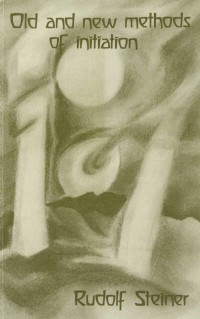Old and New Methods of Initiation
GA 210

These lectures deal not only with the theme of initiation into the ancient mysteries and how that contrasts with what is required today of people treading a spiritual path of knowledge, but also covers such topics as the working of Lucifer and Ahriman in the threefold organization of the human being; the relationship of the individual to the folk spirit; and the need to think with exactitude and impartiality.
The last four lectures examine in some detail the impulse of freedom behind the work of Goethe and Schiller, particularly Faust and the Aesthetic Letters, and draw interesting connections with Shakespeare on the one hand and French Revolution on the other.
This edition was translated from the volume in the Complete Edition of Rudolf Steiner's works entitled, Alte and Neue Einweihungsmethoden (GA 210), first edition, 1967. It was translated by Johanna Collis, and edited by Joan M. Thompson. The Cover design is by Brian Gold. The diagrams in the text were redrawn from Rudolf Steiner's blackboard sketches by Hedwig Frey.
| Lecture I | January 01, 1922 | |
| The working of Lucifer and Ahriman in the human being's body, soul and spirit. | ||
| Lecture II | January 07, 1922 | |
| Distinction between human beings of East, West and the middle region. Contemplation of the Christ-being. | ||
| Lecture III | January 08, 1922 | |
| The development of religious life during the post-Atlantean cultural periods. | ||
| Lecture IV | January 19, 1922 | |
| Intimate aspects of soul and spiritual life. Crossing the threshold. Contrast between West and East. | ||
| Lecture V | February 01, 1922 | |
| Imagination, Inspiration, and Intuition as actions on the way to reincarnation. The individual's relationship to the folk spirit — the cause of disorder among nations. | ||
| Lecture VI | February 11, 1922 | |
| Ancient Mystery wisdom — ‘the prince of this world’, an opponent of Christ. Two main aspects of initiation. Cultivation of the will. | ||
| Lecture VII | February 12, 1922 | |
| Old and new methods of initiation. Thinking with exactitude. Impartiality. | ||
| Lecture VIII | February 17, 1922 | |
| Metamorphosis of soul aspects during life on earth and life in the spiritual world. The heathen and Old Testament streams. | ||
| Lecture IX | February 18, 1922 | |
| The threefold human organism and repeated earthly lives. The heathen stream and the Old Testament stream. Cyprianus (Calderón) and Faust (Lessing and Goethe). | ||
| Lecture X | February 19, 1922 | |
| Threefold man in relation to the four elements and to Imagination, Inspiration and Intuition. The need for spiritual life. | ||
| Lecture XI | February 24, 1922 | |
| Shakespeare, Goethe and Schiller in connection with the spiritual change of the fifteenth century. | ||
| Lecture XII | February 25, 1922 | |
| The spiritual struggle of Goethe and Schiller during the age when intellectualism triumphs over ancient spirituality. | ||
| Lecture XIII | February 26, 1922 | |
| Recapitulation of the previous two lectures. The search for access to the spiritual world out of a modern constitution of soul. | ||
| Lecture XIV | March 19, 1922 | |
| The ideal of freedom in the work of Schiller and Goethe. The French Revolution. How can man as a social being achieve freedom? | ||

